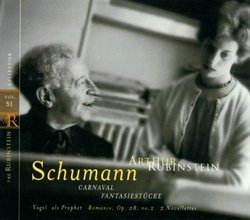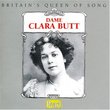| All Artists: Robert Schumann, Artur Rubinstein Title: Rubinstein Collection, Vol. 51 Members Wishing: 1 Total Copies: 0 Label: RCA Release Date: 3/6/2001 Album Type: Original recording remastered Genre: Classical Styles: Chamber Music, Historical Periods, Classical (c.1770-1830), Modern, 20th, & 21st Century Number of Discs: 1 SwapaCD Credits: 1 UPC: 090266305124 |
Search - Robert Schumann, Artur Rubinstein :: Rubinstein Collection, Vol. 51
 | Robert Schumann, Artur Rubinstein Rubinstein Collection, Vol. 51 Genre: Classical
|
Larger Image |
CD DetailsSimilar CDs
|
CD ReviewsBold and Poetic Schumann Hank Drake | Cleveland, OH United States | 04/16/2001 (5 out of 5 stars) "Arthur Rubinstein was more at home with Schumann than with any other German composer except Brahms. This is understandable, especially when one considers that Rubinstein's mentor, Joseph Joachim, was a close associate of Johannes Brahms, who was in turn a close friend of both Robert and Clara Schumann. Carnaval, Op. 9 was particularly close to Rubinstein's heart. It was a mainstay of his concert programs throughout his career, including at his very last concert in 1976. Rubinstein avoids the temptation to overly sectionalize the work--this is a remarkably direct performance. True, there is plenty of contrast between the extroverted Florestan and meditative Eusebius aspects of Schumann's musical nature, but Rubinstein never exaggerates these for pianistic effect. Incidentally, Rubinstein does not play the Sphinxes section midway through the piece. Schumann left it to the interpreter's discretion as to whether to play this part, which is notated unconventionally. Some have chosen to play it (Rachmaninoff {whose recording was considered by Rubinstein the greatest ever made, and which is mandatory for any serious piano collector}, Horowitz, and Uchida, among others); some have opted out (Rubinstein, Cherkassky, and Clara Schumann, to name a few). The Fantasiestucke, Op. 12 featured on some of Rubinstein's earliest programs, including from his first American tour in 1906. He recorded it three times: in 1949; the stereo version featured here, from 1962; and in 1976 as part of his final solo recording. (There is an additional, live version from 1975 which Rubinstein did not authorize for release--it should be avoided at all costs.) The 1962 version is the finest of Rubinstein's recordings of the piece, and mainly for the same reasons which make the companion Carnaval work so well: the artful balance of detail with totality. This is balanced, as opposed to schizophrenic, Schumann playing. Rubinstein approach suits these pieces better than in his recording of Kreisleriana. The shorter pieces are effective makeweights to this collection. It is regrettable that Rubinstein never recorded a complete set of Novelettes or Waldszenen, but that was generally not Rubinstein's way. The 1960s recordings still sound remarkably full and well balanced, with even more presence here than on earlier releases." One of Rubinstein's great recordings jsa | San Diego, CA United States | 07/17/2007 (5 out of 5 stars) "I heard Artur Rubinstein in recital only once - 1970 in San Diego - and recall that he played Bach, Schubert & Chopin. I was a teenager then & my exposure to serious music was limited, & even though Rubinstein played the famous "Heroic" polonaise of Chopin (which even I knew at the time) what I remember most vividly was his performance of Schumann's Fantasiestucke. Clearly this was music that was very close to him. Later, when I acquired my first Rubinstein album, it was these recordings of Carnaval & Fantasiestucke, & not Chopin, for which he was most famous, that I bought. I have heard many other Carnavals since, including Claudio Arrau's famous 1939 recording (as well as his disappointing stereo remake for Philips), but none have quite the same cohesiveness & sparkle as Rubinstein's. The technical challenges, which are considerable, are dispatched with consummate ease & the recorded sound is warm & rich. This is a recording that has stood the test of time very well. The same goes for Fantasiestucke, which is a completely magical recording. There is a stateliness combined with flights of fancy that are inimitable here - listeners would be hard pressed to find another interpretor with Rubinstein's insight & golden tone. As for the balance of the material on the disc, consider it a bonus; buy it for Carnaval & Fantasiestucke. Very highly recommended!" Elegance and panache without equal Jurgen Lawrenz | Sydney, Australia | 05/04/2010 (5 out of 5 stars) "It is well, I think, to begin with the confession that Artur Rubinstein is a long, long way from being my favourite pianist. I guess for someone whose favourite Schumannian is Geza Anda (and Chopinians Gilels Chopin: Piano Concertos Nos. 1 & 2 and Moravec Chopin: Nocturnes, not Rubinstein), it seems self-explanatory. And so to the business in hand.
Absolute, enchanting magic; achingly beautiful and subtle pianism! The elegance of Rubinstein's handling of these works seems as if they played themselves, straight out of Schumann's overflowing imagination. I first bought this recording about 40 years ago on LP; and I have not stopped trying to find an equal -- but there is none. In Fantasiestücke, the test case for me has always been No. 2 -- amazing how few pianists get that left-hand crescendo in the recapitulation right, not too strong, but by no means to be underplayed. Rubinstein is perfect here; as in his choice of tempo for the first number, which most pianists play a whisker faster (or slower), and therefore too fast (or slow). Carnaval is highly spirited, a young man of 60 letting fly with all the panache and wit which I miss so much in his Chopin (e.g. Artur Rubinstein - The Chopin Collection: The Nocturnes aaaaah! blasphemy!). There is one (relatively marginal) downside to the Carnaval. For this work he chose a very light piano. Maybe he needed it for the lightness of touch, but it tends to sound thin and clangy when it is pushed. A small blemish (I mention it in case you love deep Bösendorfer type sonorities -- nothing like that on exhibit here). My recommendation is simple. Even if (like me) you are an inveterate collector with a dozen or more renderings of these works in your collection already, don't pass this bye. It belongs among those albums that make you thank heaven for letting us invent the grammophone!" |

 Track Listings (33) - Disc #1
Track Listings (33) - Disc #1

